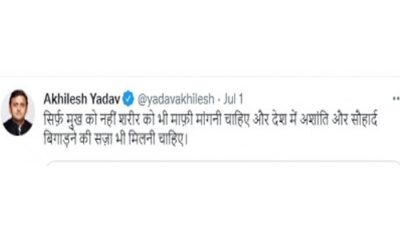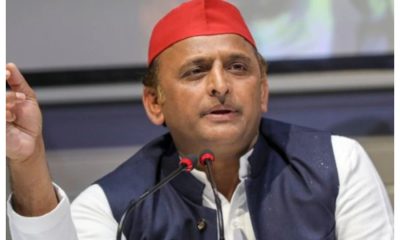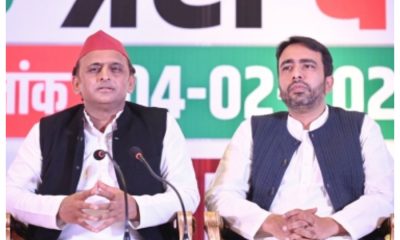National News
Akhilesh Yadav will leave state on March 10: UP BJP president
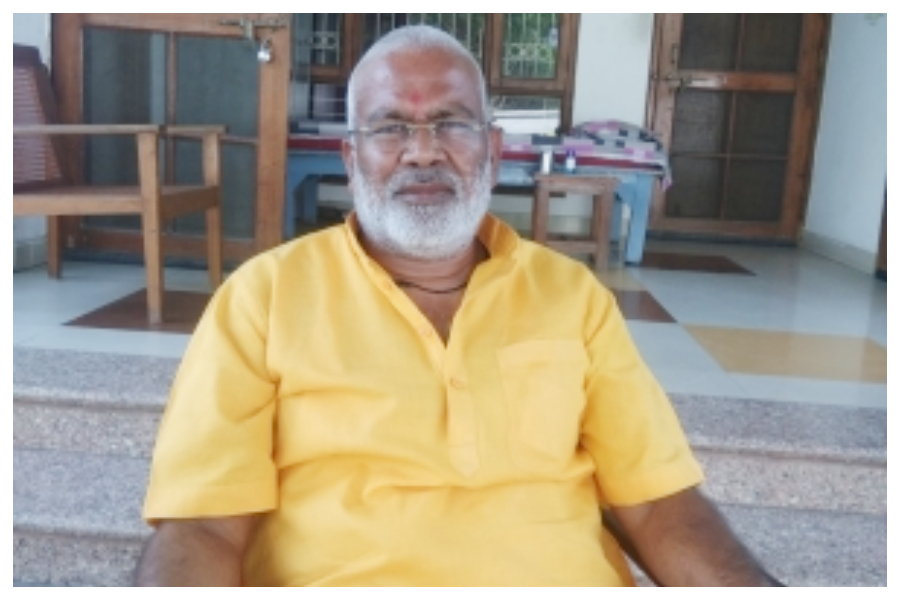
As Uttar Pradesh enters the final and the seventh phase of polling, State BJP President Swatantra Dev Singh said that after the poll results on March 10, Samajwadi Party (SP) chief Akhilesh Yadav will finally leave the state and will travel to London.
The State BJP President in an exclusive interview with IANS said, till the sixth phase of polling, the BJP will win more than 300 seats. Akhilesh Yadav, who claims to win 400 seats, will leave Uttar Pradesh on March 10 for London and close down his party office.
Asked about the SP Chief’s claims that the BJP will face defeat, Singh said, “Akhilesh Yadav’s comments should not be taken too seriously. He made such remarks in 2014, 2017 and in 2019 as well. Leaders like him have forged various alliances in the past and will lose their relevance during the current Assembly polls.”
The BJP is a disciplined party, he said, adding, “I recently met an electoral officer from Bengaluru, who said elections are taking place peacefully in Uttar Pradesh. Our party workers participate in elections by following all rules and regulations. There is no indiscipline in our party. Any individual can make any kind of claims against us? Our party workers focus on their work. They do not have any time for controversies.”
On the question of Sanghmitra Maurya, daughter of former Cabinet Minister Swami Prasad Maurya, campaigning against the party, Singh said, “She has not campaigned against our party. If and when the issue comes to our attention, we will take a decision on it.”
Singh further said, “The BJP talks only about development. But if there was an exodus of a particular community during the previous government, then it is our duty to inform the people about it. Whatever wrong doings the SP government had committed, people have a right to know about it. A party like the SP openly backs terrorists.”
On BJP asking for votes from Muslim women, Singh said, “Muslim women have become free from regressive practices such as Triple Talaq. They have been allotted houses under the Pradhan Mantri Awas Yojana and have full faith in the Narendra Modi government. Muslim women have benefited from various welfare schemes launched by the Centre and the state government. They will surely vote in large numbers for the BJP.”
On the question why BJP has not fielded a single Muslim candidate, the State BJP president said, “BJP is a worker-based party. It reviews the candidates who were allotted tickets in previous elections after which they are finally given tickets.”
Asked how will the BJP fight the caste-based alliances in Purvanchal, Swatantra Dev Singh said, “This time people are voting in the name of development and the rule of law.”
How do you see the SP, Congress and the BSP faring during this election, he added, “All three parties are fighting to remain relevant. They are no match to the BJP, which is again going to form the government in Uttar Pradesh with full majority.”
How will you see the BJP performing during the last six phases of elections, he said, “The BJP will win more than 300 seats of the six phases held so far. This time women are actively participating in the electoral process and are voting in favour of Narendra Modi and Chief Minister Yogi Adityanath. People will vote only for development. The BJP will again form the government with an absolute majority in the state.”
Asked about the five poll issues on which the BJP is contest elections, he said, “Law and order, housing for the poor, toilets, free ration and transparent governance. All the opposition parties only want to exploit the poor. In a global pandemic like Covid-19, the BJP government worked to serve the poor and the marginalised sections of the society. Parties like the SP and the BSP are nowhere. The welfare schemes of the government both by the Centre and the state have successfully reached every village and people have benefited from them. Basic facilities like electricity have considerably improved in the state.”
Crime
Palghar Crime: Pelhar Police Seize Banned Gutkha Worth ₹6.39 Lakh, Shopkeeper Arrested In Nalasopara
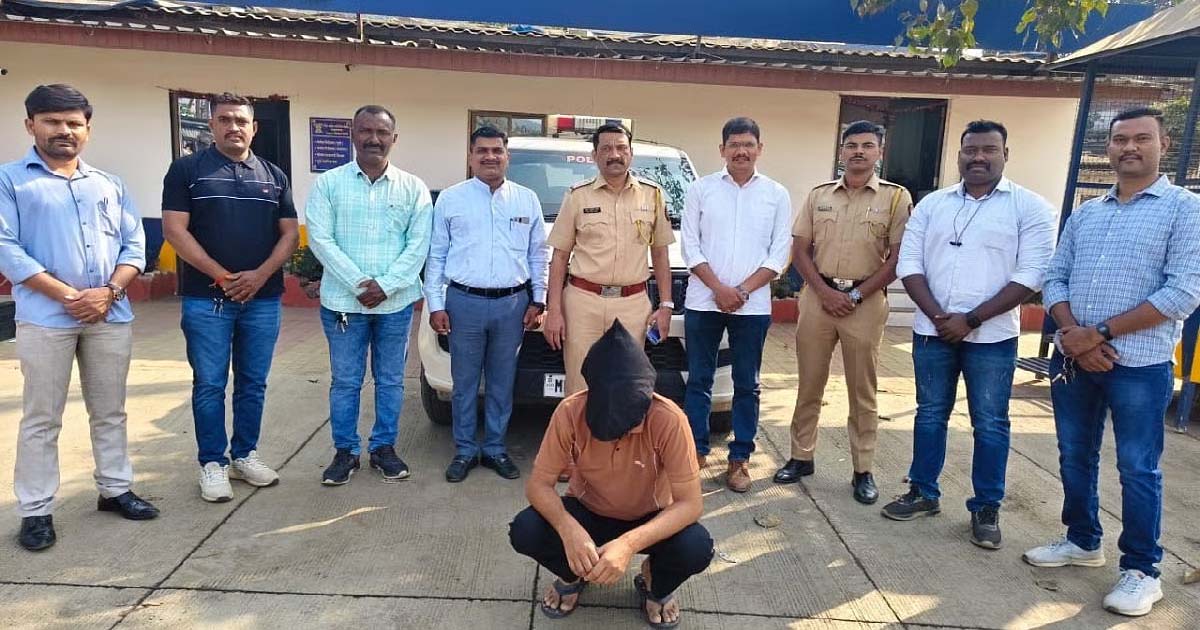
Palghar, Maharashtra, Dec 27: In a significant crackdown on the sale of banned tobacco products, the Pelhar Police arrested a shopkeeper for illegally stocking and selling gutkha, seizing contraband worth ₹6.39 lakh.
According to police, the action was carried out on December 25, 2025, during a routine patrol by Assistant Police Inspector Ramesh Waghchaure along with his team.
Acting on specific and reliable information, the police raided Sana General Stores located at Khan Chowk, Nalasopara Station Road, Nalasopara East, Vasai.
During the raid, the shop owner was found in possession of Maharashtra government-banned tobacco products (gutkha), allegedly kept for sale. The accused has been identified as Javed Ahmed Zaheer Ahmed Ansari (38), a resident of Nalasopara East.
Upon searching the shop premises, police recovered banned gutkha products valued at ₹6,39,493. Following the seizure, Pelhar Police registered a case against the accused, invoking Section 123 of the Bharatiya Nyaya Sanhita along with relevant provisions of the Food Safety and Standards Act, 2006 (Sections 26(2)(i), 26(3), and 26(4)).
Further investigation in the case is being carried out by Waghchaure. Police officials stated that such drives against banned substances will continue to protect public health and ensure strict enforcement of the law.
National News
BMC Elections 2026 | ‘Fight Election, Win Majority’: Sanjay Raut’s Sharp Response To Waris Pathan’s, ‘Why Can’t Khan, Pathan, Shaikh, Qureshi, Syed Become Mumbai Mayor?’ Remark

Mumbai: Shiv Sena UBT MP Sanjay Raut on Saturday, December 27, has strongly replied to to remarks made by AIMIM’s national spokesperson Waris Pathan, over who can become the mayor of Mumbai. Pathan had questioned, “Why can’t a Khan, Pathan, Sheikh, Qureshi, Syed become the Mumbai mayor?”
Responding to Pathan’s remarks, Raut said that elections should be fought democratically and decided by numbers. “Fight the election, win a majority and bring in 110 seats,” the Sena UBT MP said. He further added, “We have always maintained that Mumbai’s mayor should be a Marathi-speaking person”, adding that if Waris considers himself a Mumbaikar, he should demonstrate public support through the electoral process.
While speaking to news agency Media, Waris Pathan spoke on the upcoming Municipal Corporation Elections, where he questioned, saying, “Why can’t a Khan, Pathan, Sheikh, Qureshi, Syed become the mayor?”
He claimed that one day a Hijab-wearing woman will also become a mayor. He added, “Muslims have been leaders in the nation already… They (Maharashtra government) have no response to the lack of development and farmers’ suicide… They simply want to spread polarisation…”
NCP leader Zeeshan Siddique said that anyone can be sent to the position of Mayor, while their caste or religion should not matter. He expressed belief that the city needs a person who believes in getting things done.
Further adding, he said, “The mayoral chair should go to someone who has faith in work… If you look around Mumbai, the condition of the city’s roads and infrastructure is poor. Even though BMC receives funds worth thousands of crores, the work does not get done.”
The elections for 227 seats of BMC will be held on January 15, while the counting of votes will be held on January 16. The last polls for the 227 seats were held in February 2017. The BMC elections become crucial as the Mahayuti secured a landslide majority in the 288 municipal councils and nagar panchayats, winning 207 president posts in the local bodies. The Opposition Maha Vikas Aghadi could come up with a collective tally of 44.
In the BMC polls, the total number of registered voters stands at 1,03,44,315 across all wards, of which 55,16,707 are male voters, 48,26,509 are female voters, while 1,077 voters are listed under the ‘other’ category.
Crime
Mother strangles 6-year-old to death in Navi Mumbai for not speaking Marathi
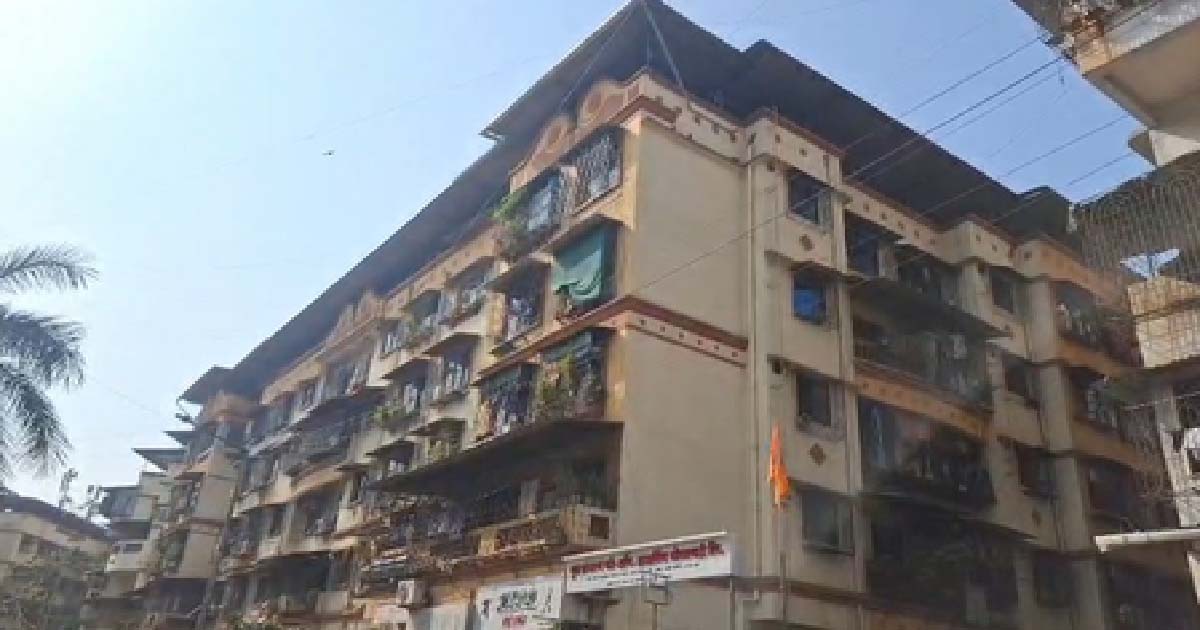
Navi Mumbai, Dec 27: In a shocking and disturbing incident from Navi Mumbai, a woman allegedly murdered her six-year-old daughter because the child could not speak Marathi, sending shockwaves across the city.
The police have arrested the mother in connection with the case after attempts were made to pass off the child’s death as a heart attack.
The incident came to light after the police grew suspicious of the circumstances surrounding the child’s death and ordered a post-mortem examination, which revealed that the girl had died due to asphyxiation.
Following intensive questioning, the truth behind the incident was uncovered.
The heart-wrenching crime was reported from the Kalamboli suburb of Navi Mumbai. In Gurusankalp Housing Society in Sector-1, Kalamboli, the 30-year-old woman allegedly strangled her own six-year-old daughter to death.
The Kalamboli police have arrested the woman and initiated further investigation into the matter.
According to information provided by the police, the family consisted of an IT engineer husband and his wife, who holds a B.Sc. degree. The couple got married in 2017 and welcomed their daughter in 2019.
However, from a very young age, the child reportedly had difficulty speaking and mostly communicated in Hindi instead of Marathi.
This reportedly became a recurring source of anger for the mother. During the investigation, it emerged that she often expressed resentment about the child’s speech, repeatedly telling her husband, “I don’t want such a child; she doesn’t speak properly.”
The husband, police said, had tried to reason with her on several occasions.
On the night of December 23, the woman allegedly decided to kill the child. Coincidentally, the grandmother had visited the house that day, but could not meet the girl.
Later, when the husband returned home and found the child unresponsive, the family rushed her to the hospital.
At the hospital, an initial claim was made that the child had suffered a heart attack. However, Senior Police Inspector Rajendra Kote of Kalamboli Police Station found the circumstances surrounding the death suspicious and ordered a post-mortem examination.
The preliminary medical report indicated obstruction of the airway, pointing towards asphyxiation.
Following this revelation, the police subjected the parents to sustained questioning. After nearly six hours of interrogation, the mother allegedly confessed to strangling her daughter.
She has since been arrested in connection with the crime.
It has also come to light during the investigation that the woman was undergoing treatment with a psychiatrist.
The police are continuing their probe to ascertain all aspects related to the case and the mental condition of the accused.
-

 Crime3 years ago
Crime3 years agoClass 10 student jumps to death in Jaipur
-

 Maharashtra1 year ago
Maharashtra1 year agoMumbai Local Train Update: Central Railway’s New Timetable Comes Into Effect; Check Full List Of Revised Timings & Stations
-

 Maharashtra1 year ago
Maharashtra1 year agoMumbai To Go Toll-Free Tonight! Maharashtra Govt Announces Complete Toll Waiver For Light Motor Vehicles At All 5 Entry Points Of City
-

 Maharashtra1 year ago
Maharashtra1 year agoFalse photo of Imtiaz Jaleel’s rally, exposing the fooling conspiracy
-

 National News1 year ago
National News1 year agoMinistry of Railways rolls out Special Drive 4.0 with focus on digitisation, cleanliness, inclusiveness and grievance redressal
-

 Maharashtra1 year ago
Maharashtra1 year agoMaharashtra Elections 2024: Mumbai Metro & BEST Services Extended Till Midnight On Voting Day
-

 National News1 year ago
National News1 year agoJ&K: 4 Jawans Killed, 28 Injured After Bus Carrying BSF Personnel For Poll Duty Falls Into Gorge In Budgam; Terrifying Visuals Surface
-

 Crime1 year ago
Crime1 year agoBaba Siddique Murder: Mumbai Police Unable To Get Lawrence Bishnoi Custody Due To Home Ministry Order, Says Report





